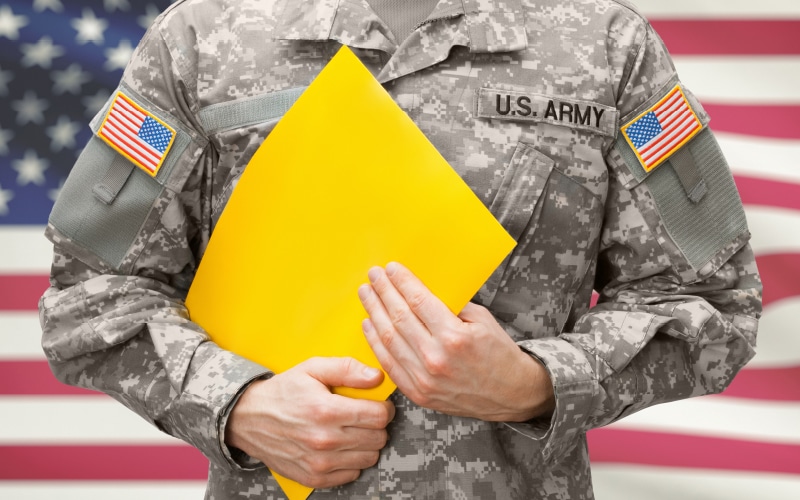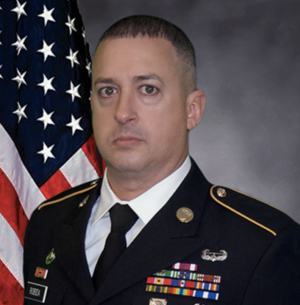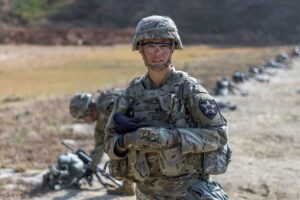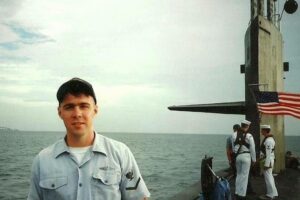A New Mission: Military Vets Enlist in Logistics

Military veterans are reporting for duty in today’s supply chain workforce. Companies are tapping into this well-trained and disciplined group of employees to help ease driver shortages and translate their hard-earned skills into fulfilling positions in transportation and logistics.
When they finish their mission of service to our country, an increasing number of U.S. military veterans are finding a new mission: reporting for duty at various jobs in the transportation and supply chain sector. With a firmly ingrained sense of discipline, hard work, responsibility, and commitment to safety, military veterans are well aligned for careers in the transportation world—and are often employees of choice for transportation and logistics companies.
“We look for employees who embody our six core values—creativity, integrity, collaboration, growth, excellence, and wellness—and many military veterans check all of those boxes,” says Jason Turner, vice president, talent and growth initiatives for ArcBest, a supply chain logistics firm based in Fort Smith, Arkansas, that has garnered a “4-Star Employer” designation from VETS Indexes and currently employs about 1,300 veterans.
“Veterans have been tested, many of them to ultimate extremes, so they possess great grit and ability to withstand challenging situations,” he says. “They’ve also learned through their training how to work with a team. And, veterans are a natural pool of diverse talent because they come from so many different walks of life.”
“Military veterans add major value to the workplace,” adds Tony Graham, a National Guard and U.S. Army veteran who serves as president of West Division at XPO, an LTL freight transportation provider that was also recently named a VETS Indexes 4-Star Employer with roughly 8% of its workforce self-identifying as veterans.
The company’s veteran employees range from truck drivers and dockworkers to HR professionals and account executives, all the way up to leadership positions in the C-suite.
“Veterans have powerful skillsets and qualities that translate well to any industry, but especially to logistics and freight transportation,” Graham says. “They understand the importance of following procedures, adhering to schedules, and performing tasks to the best of their ability.”
Employees with these skills are sought after by companies like XPO because they “demonstrate a level of resiliency and adaptability that enables us to adjust to unpredictable situations so we can stay agile and responsive to our customers’ rapidly changing needs,” Graham says.
Trucking, in particular, holds a strong lure for veterans. At least one in 10 truckers are veterans, double the rate of workers in general, according to 2019 Census data.
Drivers who are military vets also display superior safety records behind the wheel and show impressive company loyalty: veteran drivers had 42% fewer accidents, drove 98% more miles, and had 68% fewer involuntary terminations than non-veterans, notes a 2016 study.
Getting more military veterans into truck-driving jobs is a priority for many companies given the strong workforce demands for transportation positions.
The American Trucking Associations estimates the trucking industry is currently facing a shortage of more than 78,000 truck drivers coupled with a need to hire 1.2 million new drivers over the next decade to meet increasing freight demands.
Recruiting and Retaining Vets
Many transportation companies are focused on recruiting and retaining military veterans as a key part of their labor strategy.

Ryan Robida, military and veteran recruiting manager, TMC
Ryan Robida, military and veteran recruiting manager for TMC, logs nearly as many miles as the company’s drivers when he attends job fairs at military installations across the country in search of veteran employee candidates. A 20-year military veteran who retired in 2017 as a master sergeant and worked as a recruiter within the Army, Robida notes that TMC, an employee-owned flatbed carrier in Iowa, counts nearly 40% of its drivers as veterans.
“Military veterans have integrity like no one else,” Robida says. “You are trained in the military to do the right thing, even when no one is looking—and truck drivers need those same qualities.
“In transportation, it’s just you, your truck, and the open road,” he adds. “There’s nobody sitting next to you monitoring your performance.”
Veterans also tend to stick around, even when times are tough as they are used to honoring their commitments as part of their military service.
In return, TMC shows strong support for its military veteran employees. The company is proud to have a VA-approved apprenticeship program that allows veterans to train for their driver certification and receive compensation from both TMC and through the U.S. military’s GI bill while they complete their training.
The company also maintains flexible schedules for veteran employees who are part of the Army Reserves and need time off for missions or other commitments.
TMC’s focus on hiring military veterans—as well as its performance- and percentage-based pay structure and generous benefits—plays a huge role in the company’s stellar retention rates. “The national turnover average for truck drivers has historically been as high as 91%,” Robida notes. “In 2022, TMC’s turnover rate was half the national average.”
Successful Transitions
Training programs developed via partnerships between industry, military, government, and union organizations that help veterans upskill or reskill for jobs in transportation are particularly effective.
Through the Teamsters Military Assistance Program, ArcBest’s ABF Freight carrier works with the military to run driver training schools for veterans nearing the end of their service at Fort Riley, Kansas and Fort Carson, Colorado. The six-week courses prepare transitioning service members to earn their CDL so they can transition directly into trucking jobs. To date, the company has more than 800 graduates of the program.
ArcBest also participates in the Department of Defense’s Skill Bridge program, which helps service members gain civilian work experience through specific industry training, apprenticeships, or internships during the last 180 days of service.
Beyond driving jobs, the company is also focused on growing other pathways for transitioning service members.
“We just had our first Marine go through the Skill Bridge program, and he ended up in our internal audit department,” notes Turner. The company has also instituted a referral program, where veterans who refer other veterans to the company for training and employment receive financial incentives.
Strong Partnerships
XPO’s talent acquisition team works closely with the Department of Labor and Veteran Commission and Military transition offices to create pathways for veterans and military spouses to be referred for roles at XPO.
“We also have strong partnerships with organizations like Military.com and Private Public Partnership, a U.S. Army reserve program, to help attract military talent,” explains Graham.
The company also offers a dedicated recruitment site for veterans with a tool that matches military experience to employment opportunities within XPO to help support their transition.
As a result, veterans at XPO work across a diverse range of careers within sales, service, commercial driving, operations, technology, and human resources.
XPO also offers its own Field Management Training (FMT) program, which provides comprehensive career development for entry-level professionals in freight transportation.
While not specifically designated for veterans, the 14-week program has proven to be a valuable transitional program for service members, and that more than 26% of the 2022 graduating class are former military personnel.
For veterans facing what can be a challenging transition into the civilian workforce, knowing they bring skills that are highly valued by the transportation and logistics fields is a big plus. After making sacrificing to serve their country, being welcomed into a military-friendly workplace goes a long way.
At XPO, that means things like a veteran steering committee that maintains partnerships with military organizations and guides the company’s engagement with its military and veteran employee population. The group also fosters camaraderie among military-connected employees by participating in local community events like the Pat Tillman Run in Arizona.
XPO also shows appreciation for military vets’ service and sacrifice by honoring veteran drivers who achieve safety milestones with a custom military-wrapped truck.

Melissa La brings the discipline, teamwork, and promptness she learned during her four years in the Army to her role as a dockworker for XPO’s Lake Forest, California, terminal.
A military-friendly workplace is part of what drew Melissa La to her role as a dockworker at XPO’s terminal in Lake Forest, California. La served for four years in the Army, including one year spent in South Korea, where she drove a truck for long-distance, top-clearance cargo missions. When she entered civilian life and began working for XPO, the familiarity of a transportation company helped her feel at ease.
In addition, she says, “my supervisors have been great in supporting me and making sure that my goals are met.”
She draws on the discipline, teamwork—and promptness—she learned while serving to bring her A-game to work each day at XPO. In the Army, La adds, everyone gets a “battle buddy” and she carries that through to her work on the docks.
“I see my co-workers as my battle buddies,” she says. “We work as a team, and we stick together, no matter what.”

After 26 years in the Navy, Travis Wagner transitioned to logistics. In addition to his role as senior manager, customer operations, for ArcBest, he serves as president of the company’s veteran employee resource group.
A Sense of Brotherhood
That sense of camaraderie is something Travis Wagner, senior manager, customer operations, for ArcBest, also found crucial in his transition to logistics after 26 years in the Navy.
A former Submarine Force officer who also worked in the Pentagon and at the Office of Naval Intelligence, Wagner was hoping to mimic the sense of brotherhood he felt in the Navy when joining ArcBest.
Though logistics was an entirely new field to him, he was drawn to the company’s culture. “It aligned closely with the Navy’s values of honor, courage, and commitment. Seeing that they valued some of those same things—like integrity and wellness—made me think I could find a home here.”
Wagner also serves as president of the company’s veteran employee resource group (VERG), which aims to support veteran employees’ mental, social, physical, and financial wellness and help with transition to civilian work through career support and mentorship. Started earlier in 2023, the group is up to about 60 members who communicate regularly and meet for social events.
“The military is close knit, so we wanted to create that sense of connection for our veterans across the company,” Wagner says.
What Works
ArcBest also pays close attention to challenges military veterans face when adjusting to life in civilian jobs. Even seemingly mundane things like getting used to 9-5 schedules and figuring out financial obligations can be stressful for former service members.
Not surprisingly, job retention is tough among new veterans, which is why companies like ArcBest have tailored programs and initiatives aimed at keeping veterans in the workforce.
“First-year turnover of transitioning service members is a real concern and so we train them on resilience and keeping up with social and mental health,” explains Turner. “We also focus on financial wellness, getting them used to their new financial responsibilities.”
The vigilance pays off for ArcBest. Once veterans make it through that crucial first year of employment, they generally stick around—often for good.
“One leading cause of turnover after that first year is retirement,” Turner says. “When they find their way, and we get them through that awkwardness of the first year, we have a neat story of retention.”
Turner credits the company’s culture and mission as the force of the staying power. “It’s so enjoyable to be able to celebrate so many veterans building their careers with us.”
Vets Combat Driver Shortages
High turnover rates coupled with ongoing driver shortages have been a persistent headache for the transportation industry. It’s easy to see why trucking companies are so eager to tap into a dependable workforce.
Making that military-to-transportation industry link more effective is the goal of a new public-private partnership known as Task Force Movement (TFM). Launched in 2022 in support of President Biden’s Trucking Action Plan, TFM has brought together transportation industry stakeholders to help enact strategies to broaden hiring efforts. These include transitioning service members, veterans, and military spouses.
The group has also identified four key areas of improvement that can help to attract military service members into the trucking profession. “We are working to rebrand the industry and change the narrative around what it means to be a truck driver,” notes Elizabeth Murray-Belcaster, TFM’s senior advisor of communications and public relations. “There are a lot of misconceptions about the industry. Driving is actually a well-paying job that provides a sustainable living for families.”
TFM is also enacting programs to increase access to quality training and employment for veterans who wish to obtain their Commercial Driver’s License (CDL), and improving the transferability of military skills. The goal is for veterans who served as truck drivers in the military to have their credentials translate for civilian trucking jobs.
In addition, to help with job retention once veterans are placed in driving positions, TFM is focusing on the link between “whole person care” and veteran workforce success.
“The healthcare portion of all of this has been overlooked,” says Elizabeth Murray-Belcaster, who explains that many veterans come back from service with issues like post-traumatic stress and other traumas. Added to that, the trucking industry has high rates of occupational hazards including obesity and diabetes—which can add up to an unhealthy combination.
“We realize that the retention piece for the industry is going to be hard to combat until we start correcting some of the lifecycle health and wellness pieces of the puzzle,” she explains.
